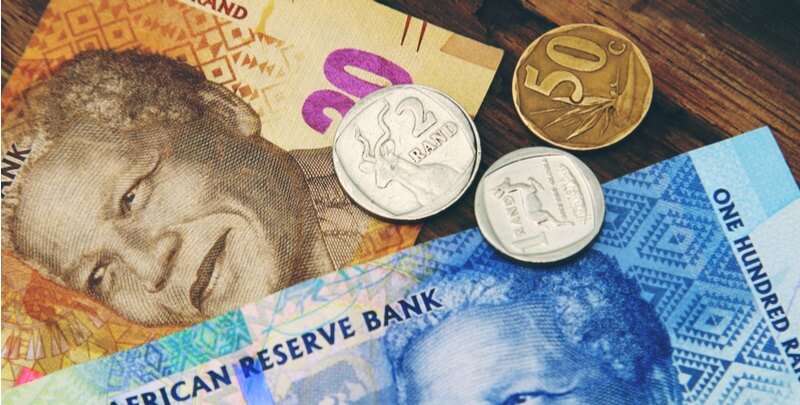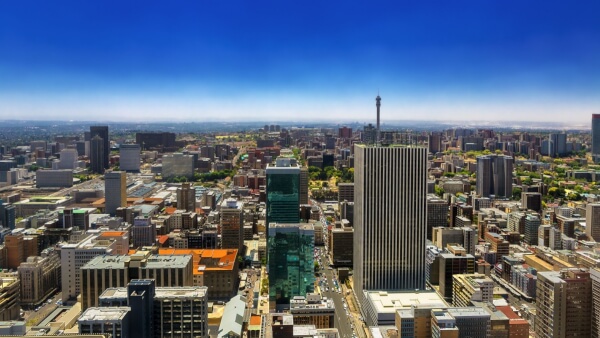Taking cash in or out of South Africa: What are the rules?
How much money can you take to South Africa from the UK? Read this handy guide for info on the rules for taking cash in and out of South Africa.

Sometimes called the Rainbow Nation because of its diversity of cultures, people all over the world are increasingly noticing South Africa — and for good reason. The southernmost part of Africa is home to some of the world’s most beautiful landscapes and wildlife, as well as modern and progressive cities. Tourists and expats alike are flocking to South Africa in higher numbers than ever before.
Whether you’re just visiting or looking to make South Africa your permanent home, understanding the country’s money is important — you’ll need to know how to manage it, how to spend it, and how to save it. Below you’ll find a comprehensive guide to money in South Africa.
South Africa’s currency is the South African rand.
| Characteristics of the South African rand (ZAR) | |
|---|---|
| Names and Nicknames | Rand, |
| Symbols & abbreviations | R, ZAR, c |
| 1 ZAR | One South African rand is divided into 100 cents |
| ZAR coins | Coins are available in denominations of 10, 20, and 50 cents, as well as R 1, R 2, and R 5 |
| ZAR banknotes | ZAR banknotes are available for R 10, R 20, R 50, R 100, and R 200 |
When traveling in South Africa, it’s smart to carry both ZAR and US dollars. While many shops and restaurants will accept credit cards, merchants at small, local markets may only accept cash — typically in ZAR. Many of Africa’s national parks will only accept US dollars for their entry fees, and some tourist activities, like safaris and other tours, will require that you pay and tip in USD.
Exchanging money in South Africa is fairly straightforward and follows most of the same rules you'd expect when exchanging money anywhere else.
Finding a fair exchange service can be difficult, though the following options are typically your best bet for getting a good deal:
While the first two options typically offer lower exchange rate markups and no upfront fees, there’s still a cost. Unless you live in Africa, your bank is unlikely to have ZAR on hand, and will likely charge you a delivery fee for ordering it, on top of the 5-10 percent markup US, UK, Australian and European banks often charge on the exchange rate. The last option is an exchange service that will exchange currency for you at a poorer rate than you could find online.
That’s how exchange services typically make money: they mark up the exchange rate, so even if they advertise no fees, you’re still paying more than the cash you receive is worth. A good way to find the fairest possible exchange rate is to use an online currency converter, so you go into the transaction knowing exactly what your money's worth compared to what you’re getting from the exchange service.
In some African countries, you may get better rates by exchanging money in your home country before you leave for South Africa. But exchange rates fluctuate, sometimes daily, so you’ll have to contact banks in your area close to the time of your trip to determine whether exchanging money before you depart is the best option.
Withdrawing cash from a South African bank ATM is always a good way to obtain ZAR at a fair exchange rate. Make sure to check whether your bank will charge you any foreign conversion fees for using an overseas ATM.
If you arrive in South Africa with home currency to exchange for ZAR, make sure it’s in good shape, as many exchanges won’t take even slightly damaged banknotes. Conversely, carefully check any notes given to you by an exchange service, and refuse them if they’re worn, torn or tattered.
Many merchants won’t accept damaged banknotes in South Africa, and as such, less reputable exchange services may try to offload their damaged, essentially worthless currency on foreigners. Getting stuck with damaged money can be like having no money at all.
By far the best exchange rates will come from withdrawing ZAR from a local South African bank account. If you have a friend or relative who’s willing to let you transfer them some money and withdraw it for you, take advantage of that.
Sending money with Wise means you’re guaranteed to get the exact mid-market rate — the same exchange rate you’ll find on Google — plus a small, fair transfer fee that you agree to upfront. Then, you just need to have your friend or relative withdraw your cash from their bank and have it waiting for you when you arrive.
Another option is getting a Wise borderless account, which allows you to keep and manage money in many global currencies, including ZAR. And this fall, Borderless account holders will be able to get consumer debit cards that they can use to spend and withdraw that money while traveling.
Travellers cheques are widely considered obsolete in many parts of the world, but in South Africa, they’re sometimes still used because they’re considered safer than cash and they can be replaced if they’re stolen. However, cashing a travellers cheque will often get you a very poor exchange rate, so if you’re able to use a better method to get cash, like withdrawing it from a local ATM, you’ll save money.
Many upscale shops and restaurants in South Africa will accept major credit and debit cards, including Visa, MasterCard, Maestro and American Express. Many smaller shops, restaurants and markets will only take cash, and some safaris and tours will only take cash payments in US dollars. You should always have a small amount of cash on hand in South Africa, as well as debit or credit cards for making cash withdrawals from ATMs as needed.
ATMs and points of sale in South Africa will often “helpfully” offer to charge you in your home currency, saving you from having to do the math yourself. Be aware, though, that this is usually a Dynamic Currency Conversion (DCC) scam, meaning the local bank is using whatever exchange rate it wants and keeping the overage. It takes a little more work, but you should always do the conversion yourself and choose to be charged in the local currency. It’ll save you money in the end.
Forgetting to tell your home bank you’re traveling could mean getting your credit or debit cards shut down for suspicious activity. And if there’s a time difference between South Africa and your home country, it could be hours before you can contact your bank to get them working again. Always tell your bank where you’re planning to travel and for how long.
ATMs are common in South Africa’s larger cities, but may be more difficult to find in rural areas. These tools should help:
Remember, while ATMs often offer the best exchange rates, that benefit will be lost if you choose to complete your transaction in your home currency instead of ZAR.
South Africa is home to many locally controlled banks, as well as a number of branches for international banks. You may want to check online or talk to a teller to see if your home bank has a branch operating in South Africa.
If you find your bank doesn’t operate in South Africa, you may want to check out one of these popular retail banks:
FNB is the oldest bank in South Africa and now operates subsidiaries in nearly a dozen African countries.
First Rand is one of the largest banking institutions in South Africa, providing banking, insurance and investment products.
Standard Bank operates in more than 20 African countries, as well as other key markets worldwide, making it one of the largest and most trusted banks in South Africa.
If you’re looking specifically for international banks, many are available in South Africa, including:
As South Africa continues to emerge as a tourist and expat destination, the most important thing you can know before checking it out for yourself is how to protect your money. Enjoy your stay in South Africa!
This publication is provided for general information purposes only and is not intended to cover every aspect of the topics with which it deals. It is not intended to amount to advice on which you should rely. You must obtain professional or specialist advice before taking, or refraining from, any action on the basis of the content in this publication. The information in this publication does not constitute legal, tax or other professional advice from TransferWise Limited or its affiliates. Prior results do not guarantee a similar outcome. We make no representations, warranties or guarantees, whether express or implied, that the content in the publication is accurate, complete or up to date.
*Please see terms of use and product availability for your region or visit Wise fees and pricing for the most up to date pricing and fee information.
This publication is provided for general information purposes and does not constitute legal, tax or other professional advice from Wise Payments Limited or its subsidiaries and its affiliates, and it is not intended as a substitute for obtaining advice from a financial advisor or any other professional.
We make no representations, warranties or guarantees, whether expressed or implied, that the content in the publication is accurate, complete or up to date.

How much money can you take to South Africa from the UK? Read this handy guide for info on the rules for taking cash in and out of South Africa.

Should you pay with cash or card in South Africa? A handy guide including cash etiquette, South African ATMs and using your UK card.

Read our complete guide to the South Africa digital nomad visa, covering fees, documents, eligibility requirements and how to apply.

Check out our in-depth guide on everything you need to know about buying a prepaid South Africa SIM card, including different providers, pricing, and features.

Travelling to South Africa soon? Don’t let sickness ruin your trip with this guide to all you need to know about travel health and vaccinations for South Africa

South Africa is a hugely popular destination for holiday-makers and expats alike. And it’s easy to see why. From vibrant cities to some of the continent’s...